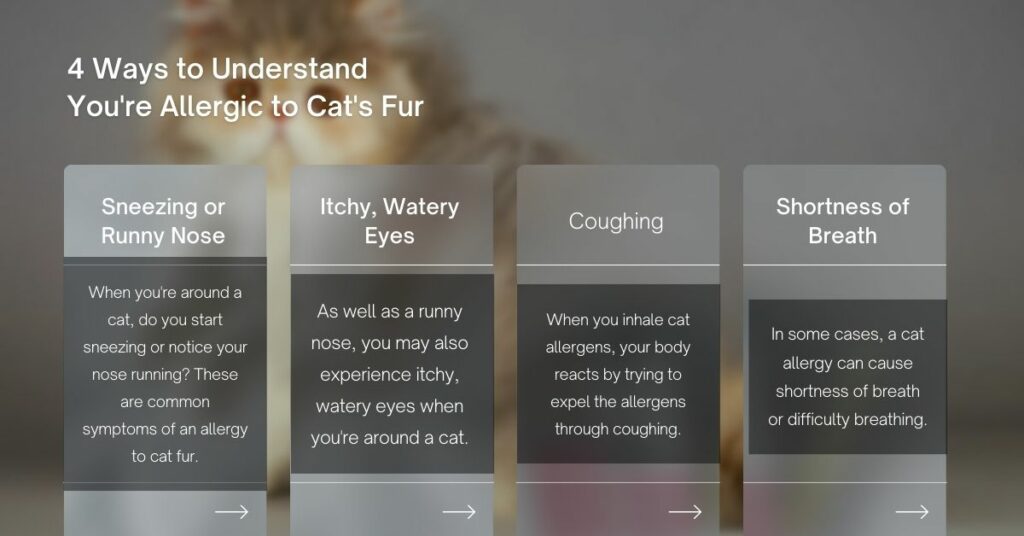Are Persian Cats Hypoallergenic?
Persian cats aren’t hypoallergenic and they do produce allergens due to the length of their fur. The allergens are produced by their skin and are spread through contact with their fur. If you’re allergic to cats, it’s best to avoid Persian cats or take measures to reduce your exposure to them.
Here in this blog post I’ll be discussing which breeds of cats are less hypoallergenic and and also some tips on how to reduce your exposure to allergens if you do have a cat.
What Does it Mean When a Cat is Hypoallergenic?

Hypoallergenic cats are those that are less likely to provoke an allergic reaction in people with allergies to cat fur. There are a number of different ways in which a cat can be classed as hypoallergenic.
One is by having a coat that produces less of the protein Fel d1, which is the main allergen found in cat saliva and skin oils. Another is by having hair that is shorter and finer, which reduces the amount of allergen that is shed into the environment.
The most hypoallergenic cats are those that have no fur at all, such as the Sphynx. While there is no guarantee that any cat will be completely allergy-free, hypoallergenic breeds are a good option for those with mild to moderate allergies.
Which Breeds of Cats are Less Hypoallergenic?

Though all breeds of cats produce some allergens, some produce more than others. If you’re allergic to cats but still want to adopt one, you may want to consider a hypoallergenic breed.
There are several hypoallergenic cat breeds from which to choose, including:
- Sphynx
- Bengal
- Devon Rex
- Cornish Rex
- Russian Blue
- Peterbald
These breeds produces less of the protein that causes allergies in humans. However, it’s important to note that no cat is completely hypoallergenic.
Allergies vary from person to person, so if you’re allergic to cats, it’s best to spend time around the animal before adopting it to see if your allergies are triggered. With a little research, you can find the perfect hypoallergenic cat for your home.
Why is the Persian Cat Worse for My Allergies?

Persian cats are one of the most popular breeds of cat, but they are also one of the least hypoallergenic. This is because they have long, thick fur that traps a lot of allergens close to the skin.
The allergens produced by Persian cats are similar to those found in other breeds, but they are more concentrated due to the length of the fur. This means that even people with mild allergies may have a reaction to Persian cats.
If you are allergic to cats, it is best to avoid Persian cats altogether. If you have a Persian cat and are struggling with allergies, there are a few things you can do to reduce your exposure to allergens.
How to Understand You’re Allergic to Cat’s Fur?

Allergies are caused by an immune system reaction to a foreign substance, such as pollen, pet dander, mold or dust mites. People who are allergic to cat fur are actually allergic to a protein found in the cat’s skin.
Here I’ll give you some tips on how you can tell if you’re allergic to cat fur:
1. Sneezing or Runny Nose
When you’re around a cat, do you start sneezing or notice your nose running? These are common symptoms of an allergy to cat fur. A study published in the “Journal of Allergy and Clinical Immunology” found that sneezing is the most common symptom of a cat allergy.
2. Itchy, Watery Eyes
A cat allergy can also cause itchy, watery eyes. If your eyes become red, itchy or teary when you’re around a cat, it’s likely that you’re allergic to the animal.
3. Coughing
I have seen people who start coughing when they’re around a cat. The cough is caused by the same reaction that causes sneezing. When you inhale cat allergens, your body reacts by trying to expel the allergens through coughing.
4. Shortness of Breath
In some cases, a cat allergy can cause shortness of breath or difficulty breathing. If you have difficulty breathing when you’re around a cat, it’s important to see a doctor as soon as possible.
How to Reduce Your Exposure to Allergens?

If you have allergies but still want to keep a cat, there are a few things you can do to reduce your exposure to allergens.
1. Keep your cat out of your bedroom
This is the room where you spend the most time, so it’s important to keep it as allergen-free as possible. If you can, have someone else in your household take care of your cat at night so that you can sleep in a allergy-free environment.
2. Groom your cat regularly
Regular grooming will help to remove allergens from your cat’s fur before they have a chance to spread around your home. It’s also a good opportunity to bond with your feline friend!
3. Invest in an air purifier
An air purifier can help to remove allergens from the air in your home, creating a safer environment for both you and your cat.
4. See your doctor
If you’re struggling to control your allergies, it’s important to see a doctor. They may be able to prescribe medication that can help to relieve your symptoms.
Will This Type of Allergies Go Away Over Time?

In some cases, people who are allergic to cats may find that their symptoms lessen over time. This is because the body can build up a tolerance to the allergens.
However, it’s important to remember that this is not the case for everyone and some people may find that their allergies actually get worse over time. If you’re concerned about your allergies, it’s best to speak to a doctor.
My Final Thoughts
Persians are one of the most popular cat breeds, but they are also one of the most likely to cause allergies.
My suggestion is, if you’re considering getting a Persian cat, is to speak to your doctor first and get their opinion. Allergies are a serious condition and it’s important to make sure that you’re fully aware of the risks before you make a decision.






